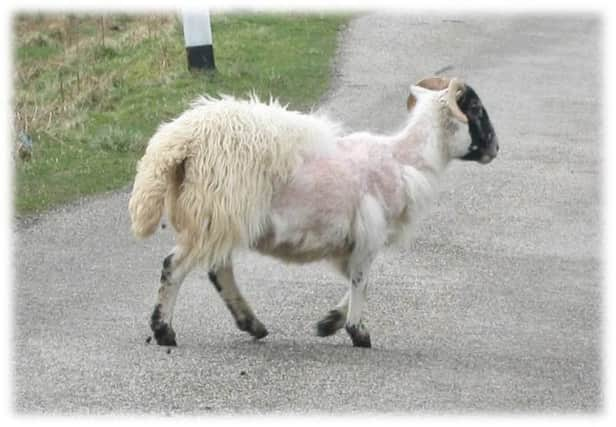Scab risk at tipping point as anecdotal cases soar


Sheep scab is caused by an infection with the mite Psoroptes ovis, but it can take weeks or even months before clinical signs are obvious, so farmers cannot tell just by looking at a sheep whether it is infected or not.
Farmers buying in sheep or sheep that have come into contact with sheep of an unknown scab status must assume they have it.
Advertisement
Hide AdAdvertisement
Hide AdSheep scab is endemic within the UK with figures suggesting between 7-10,000 clinical cases a year at an estimated cost of £12-18 a ewe.
This year the incidence of sheep scab has been particularly high.
Part of the problem could be that endemically infected flocks may not have clinical signs and farmers do not realise that scab is still active in their sheep so they are not controlling it. It could also be associated with resistance to some injectables.
Prevention
Controlling scab at farm level, especially on a reactive basis, once the parasite has taken hold in the flock can be expensive and can result in the overuse/misuse of the few treatments available.
Advertisement
Hide AdAdvertisement
Hide AdThe use of diazinon plunge dip formulations via non-validated methods of application such as showers has the potential to generate resistance in scab mites. The overuse of macrocyclic lactone (ML) injections for scab control can generate resistant gut worms, increasing the problem of anthelmintic resistance. There are also the negative economic effects of unplanned scab treatments, particularly the excessive meat withdrawal periods (MWPs) on the marketing of finished lamb.
Scab control at farm level needs to be more pro-active and strategic in order to be cost effective. For effective in-flock eradication, all sheep on/off the main holding should be treated at a convenient/cost-effective time. Winter is ideal, with the lowest number of sheep (less treatment used), more tolerable MWPs and a full fleece is ideal for plunge dipping. Once eradicated, a plan must be formulated to keep scab out and this plan must be included in a Flock Health and Welfare Plan.
For farmers buying in sheep there are three things to prevent scab from entering your flock:
1. Always assume the sheep have scab
2. Keep animals in quarantine (isolated) for at least three-four weeks
3. Treat or test the quarantined animals. This can involve:
Advertisement
Hide AdAdvertisement
Hide Ada. Blood test all the animals in quarantine after two weeks to see whether they have been in contact with sheep scab. This is the ideal first step as it can avoid unnecessary treatment.
b. Injection with Macrocyclic Lactones (ML)
c. Plunge dip using an organophosphate (OP) (diazinon) dip.
Treatment options
Correct plunge dipping is one of the best ways to remove scab, but for those farmers unable to dip due to inadequate facilities or the cost, then using the correct injectable and only when necessary is important.
It’s vital to remember all ML’s are also wormers so ensure their use is necessary at this time of the year and avoid repeat doses.
Most ML’s don’t offer persistent protection against scab. That means after treatment with a non-persistent ML sheep need to be moved to pasture that hasn’t contained sheep for three weeks, as the scab mites can live in the environment for 17 days.
Advertisement
Hide AdAdvertisement
Hide AdWhere this isn’t possible, using either CYDECTIN® 1% or CYDECTIN 2% is an option as both offer persistent protection for 28 days and 60 days respectively, meaning sheep are protected regardless of whether sheep are moved to previously grazed fields or not. However, all treatments should be discussed with your medicines provider.
The appropriate management of scab is essential on both welfare and economic grounds and in order to do so farmers should be vigilant and proactive.
About Zoetis
Zoetis is the leading animal health company, dedicated to supporting its customers and their businesses. Building on more than 60 years of experience in animal health, Zoetis discovers, develops, manufactures and markets veterinary vaccines and medicines, complemented by diagnostic products, genetic tests, biodevices and a range of services. Zoetis serves veterinarians, livestock producers and people who raise and care for farm and companion animals with sales of its products in more than 100 countries. In 2017, the company generated annual revenue of $5.3 billion with approximately 9,000 employees. For more information, visit www.zoetis.com.